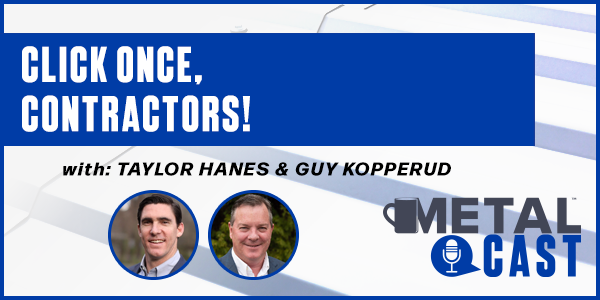UP TO THE MINUTE
The Four Key Points of Success - PODCAST TRANSCRIPT
May 28, 2025 at 3:00 p.m.Editor's note: The following is the transcript of a live interview with Rocky Bleier, a former American professional football player, veteran of the United States Army and successful construction company owner. You can read the interview below, listen to the podcast or watch the recording.
Intro: Hello and welcome to Contractor Outlook Newscast from The Coffee Shops. My name is Heidi Ellsworth and we're here to really talk about what is happening in construction overall. And that means knowing the history, really having some interesting guests who can talk not only economics, weather, but about contracting and motivation and really what it takes to win. And today, I am so, so honored to have Rocky Bleier here to speak to us not only about construction, but about award-winning football and a career that spans several decades that is so inspirational. So, Rocky, welcome to the show.
Rocky Bleier: Well, thank you very much, Heidi. Nice to be with you on this Memorial Day weekend. Can I say that?
Heidi Ellsworth: I know. We are so close to the three-day weekend. I can't wait.
Rocky Bleier: Yes, I know it.
Heidi Ellsworth: Well, I would love to start out with an introduction. I know everyone knows your name, but I would love for you to introduce yourself. Tell us a little bit about you. Let's just go through your career, what you've done and where you are today.
Rocky Bleier: Okay, fine. I'll start at the beginning. Now, I was born in a small Midwestern town ... No. For those, my name's Rocky Bleier, as had been mentioned and formerly with the Pittsburgh Steelers for 12 seasons back in the '70s and so on.But my story really goes, as I had made mention, I grew up in a small Midwestern town, Appleton, Wisconsin and had the opportunity to continue my education and went to the University of Notre Dame back in the '60s under the leadership of Ara Parseghian and got a chance to play football there and get a great education. And because of the success of that team, I always tell people you get recognized for your contribution to that success. And because of that, I get drafted into the National Football League by the Pittsburgh Steelers. Now, as I tell people, I said, I was not their first choice.
Heidi Ellsworth: Well, it worked out well for them.
Rocky Bleier: Yeah. I was the 417th person picked in the draft that year. I was a 16th round draft choice. But from my point of view, you have to understand, is that there were 17 rounds. At least I was not the last guy picked. And so I thought, "I might be able to make this team." And then people said, "Well, how'd you make the team back then?" Well, do you remember who played for the Steelers in the '60s? That's how come I made the team. Who played for them during that period of time. And so I got a chance and I made the team and I got a chance to play 10 games of that first season in 1968, when there was this conflict that was going on in the Far East called Vietnam.
And for those of us who lived through that period of time, the draft was viable and like everybody else, I got my draft notification. And one thing led to another thing and I got drafted into the armed services and eventually wound up in Vietnam with my unit. And after about 4 1/2 months in country, we were in a conflict with a military movement that was taking place, where the Marine Corps up in I-Corps, Marine Corps was pushing down the Vietnam army and we were a retaining force. And anyway, that led to a conflict in which I ultimately got wounded, shot through the left eye and a grenade blew up through my right foot, knee and thigh through that day. And so the prognosis overall was that I'd never be able to come back and play this game of football again.
But given opportunities and this is what I mean when we talk about the construction company. We talk about life, we talk about what you do with those opportunities. And I always tell people, I said I was fortunate ... I got damaged and so on, prognosis was I wouldn't be able to come back and play this game because of the injuries. But in my mind it was like, "Well, I didn't lose an arm or a leg or a foot or anything." And having played sports through most of my life up to that period of time, there are some lessons you learn as you take with you through life. And one of those lessons was that I don't care who you are, if you grow up ... Think about this. Growing up as a kid, you're playing in the backyard, you fall down, you scrape your knee, you twist your ankle, you might break a finger. And it hurts and you go home and mom kisses it or you go see the doctor and it heals and you're back out playing again.
Heidi Ellsworth: You get back up.
Rocky Bleier: You just pick it up and you keep going. And so in this case, it was like, "All right, fine." As I said, I didn't lose a limb and I thought, "Oh, okay, fine." And it took some time and given opportunities. And so just given opportunities and having ownership of the Rooney family. And so I came back and they bought me a year. They said, "If he was good enough to serve our country, let's see what our doctors can do." And so I had another operation in that year I came back, they put me on injured reserve. And so I had another operation, came back the following year, made the taxi squad, which is a developmental squad. So they bought me two years to heal, two years to get bigger and stronger, but you have to do something with that opportunity. And so I did.
I got bigger and stronger and faster and I came back in 1972 and I made the team again. And so as I tell people, I said I was the leading ground gainer during the exhibition season. Okay, fine. So when you're trying to make an impression. So I never carried the ball that season at all in '72. Franco Harris, my running mate, eventually came in as a rookie that year and dominated the running scene. But that was okay. I was playing special teams and then '73 came back again, made the team, got to carry the ball once that season and then came back in '74. Now, you have to understand, like in our lives and what we do, for me to come back in 1974, after the '73 season, in all honesty, I quit the Pittsburgh Steelers. Because in my mind, my future or to compete again, I was going to have to fight with every free agent, draft choice, rookie, person who was on the team again. And I just didn't think that it was fair.
Not that life's fair. I thought, "Well, maybe my life's going another direction." I did come back, I did make the team, I got a chance to play, maybe not to the level I thought, but that wasn't part of the deal. And I left the team. Sometimes we have outside influences within our lives. Unbeknownst to me and y Russell, who was a linebacker for us and also captain of the Steeler team when I was there earlier, gave me a call. And I was living in Chicago and so he was coming into Chicago, he said, "Let's get together. I hadn't seen you since the end of the season and just, let's have dinner. It's be great to get together."
Well, I'm not going back and I decline. And he pushed and I declined some more and he pushed some more. And then he asked me the question, why? And the only thing I could blurt out was, "I quit. I'm not coming back." And he said, "You can't quit. If you quit, what you have already done is that you've already made a decision for their coaching staff. Do you like them well enough to make decisions for them?" He said, "No. Your responsibility, if this is what you want to do," he said, "You come back and you make them make a decision. You back them in the corner. You give them every reason to either keep you or release you. But you don't cut yourself. The reality of this game is that we're all expendable. Reality of this game is we all can be cut at any time, but if this is what you want to do, then you don't cut yourself."
And maybe it was just the arm twisting I needed from an older brother I didn't have. And I went back. And everything I had perceived did take place and I had a fight with every free agent and draft choice and rookie, once again, to make the team. Leading ground gainer just in the exhibition season. Thank you very much.
Heidi Ellsworth: I love it.
Rocky Bleier: It was good enough to make the team. And the reason I was the leading ground gainer and I tell people this in all honesty, it wasn't because of the fact that was bigger, better, faster than all the other running backs. It was the simple fact that I played more than anybody else during that period of time. I carried the ball more than anybody else during that period of time. Given those two simple statistics, I'd better be the leading ground gainer during that period of time, because all they were providing for me was what? An opportunity to be able to make the team. And they had to keep me. And I was the fifth running back out of four at the beginning of the season when, unbeknownst to us, Franco Harris, who I'd mentioned before, starting fullback, got hurt. The backup became the starter. I became the backup to the backup.
I'd never been there before. So with renewed vigor, played that first game, second game and all of a sudden the backup gets hurt and I'm inserted in the game and I'm inserted in the game as a fullback. And so I'm in this game and my running mate breaks, won 43 yards, scores. We have a lead. We go in at halftime, we go over assignments, adjustments. And I'm thinking to myself, "Who's starting the second half? Maybe those guys that got you the lead in the first half." And we get to start the second half. And as a team, we win that game. Following week, everybody's still banged up. As a team, we win that game. The week thereafter it's a Monday night game, an extra day of healing. Franco now becomes healthy.
Heidi Ellsworth: Dang it.
Rocky Bleier: And so we have our pregame meal before that game. And as we said, we have a breakout group and Dick Hoak, our back field coach, says, "Okay, fine. Franco, you and Rock will start tonight."
Heidi Ellsworth: Yeah.
Rocky Bleier: Oh, I was quite confused. I didn't know how we both could play the same position. But it dawned me I wasn't going to play the fullback position because Franco was. I was playing the other running back position. Now, nobody told me that. I wish they would have, I'd been better prepared going into that game. But we started and we won that game. So we started the following week, we won that. We started remaining part of the season, we win the season, we go to the playoffs, we win the playoffs, we go to the Super Bowl, we win the Super Bowl. And we played six more years together and we win three more Super Bowls. And in 1976, Franco and I became the second set of running backs in the history of the NFL each to gain 1,000 yards rushing.
Heidi Ellsworth: Wow.
Rocky Bleier: The same year. And after 12 years, as I had made mention, I retired. So the whole concept or the lesson I learned are just obviously not to give up, but also opportunities. Opportunities that exist. Now, you have to do your part, you have to do your work, you have to do your homework. And the reason I got a chance to play wasn't because of my size or speed, two things I do not possess, but because of one talent. And Chuck Noll came up, our back field coach, said, "Listen, you have a weakness in your back field. Who is your best blocker?" And he said, "Bleier." He said, "Then start him." One talent.
And I tell people this in the fact that we all have a talent of one nature or another, different than each and every anybody else's. And it's really our responsibility to be able to define what that talent is, to bring it to the workforce, to bring it to your companies, because we all can't do everything. So you have to find out what your strengths are and what your weaknesses are and work around them as you best possibly can. And so that was my start and my opportunity to be able to move on from there.
Heidi Ellsworth: You know, I love, love that story. You told that when I saw you at the Midwest Roofing Conference. And I love hearing it again, because so many of us, there have been those times in our careers, in our life, where we just were like, "Done. I'm quitting." But to hear you come back and three Super Bowl rings, wow, that is just so cool. And then to take what you did with all of your success in football and then bring it into construction. So you've got to tell us that story. So how did you get into construction?
Rocky Bleier: So anyway, it didn't happen overnight, obviously. So it took some time, but it was an opportunity. So it was an opportunity that was created in about, I'm going to go back 1970, 1993. '93, I remember the federal government came out with a set-aside, service disabled veteran owned small business set-aside, for veterans to be able to get into the construction business. And like everybody else, there's always somebody. There's always somebody that says, "Hey, maybe you should do this," or somebody that gives you the push or gives you the opportunity. I'm not that bright. I didn't come up in the construction business. My two brother-in-laws are engineers and they have their own company and they do deep foundation construction and so on. But there was an opportunity that arose that possibly could fit this key.
And so they said, "Hey, what do you think about getting into the business?" And so they became my mentor a little bit. And so we started Rocky Bleier Construction Group at that time. And so the first job we got, I got a call from the federal building downtown Pittsburgh that was doing an entrance. They were doing HVAC in this entrance of their building. And so it was programmed as a set-aside for service disabled people. This was one of the first ones. And so I got a call, said, "Would you come down and take a look at it?" And I said, "Oh, okay, fine. Okay, fine." And so I went down and so I'm going, "Okay, what do I know about HVAC? Nothing." So I called a friend of mine. I called a friend of mine who was a good friend of mine, who happened to be in the HVAC business. He just happened to be.
And so I called him, said, "You come with me." "Okay, fine." So I opened the door and talked to the people. And so he looked around and so on. He gets all the information that we need. So then we go out, I said, "Okay, how much are you going to cost? How much do I have to pay you for this?" So he gave me a price. It was under $10,000. Okay, fine. Just my first job was under ... So I called up and I said, "This is what we can do. This is the price." They said, "Oh, okay." I said, "And who else is bidding?" They said, "It'd better be a good price, because you're the only person."
Heidi Ellsworth: Oh, perfect.
Rocky Bleier: But that was the first start. And that just was a stepping stone into that whole arena. And so like everybody else, you have to start building. Okay, you've got to start building. So we took on a role all of our own and then we started, I said, "Okay, fine." And it's like sports or it's like ownership. So it's playing for the Steelers. It was like Mr. Rooney was the owner, so he owned it. He wasn't the coach.
Heidi Ellsworth: Yeah, exactly.
Rocky Bleier: He wasn't the general manager. So you've got to get a general manager, you've got to get a coach that helps this business and bring them in. And so like everybody else, you reach out, people that you think can do the job or not. And I make this comparison because for the Steelers, it took 40 years to get to a position to get into the playoffs. They'd never won in 40 years. And so all of a sudden. So our learning curve in the beginning, we did some jobs and we got some people and opportunities and it at least was a foundation. And so as you grow, as you get bigger, you add more people and can you manage these people? And you get a project manager coming in and you get a superintendent on the job. And so all of a sudden, so we started to get some direction and went through a couple general managers along the way to develop this.
Until you get to a point where you get the right people and it's about getting the right people involved. And so I was very fortunate they became available, is our director of construction services, Jim Kephart. And I mention Jim because in the now five years that he has come aboard, we have turned this company around in the right direction. Jim, military person as well, fought in Iraq, was a Purple Heart recipient, unfortunately, like myself, but had been in the construction business since he was 18 years old. And he was in the Corps of Engineers when he was in the military. So he brought this experience back. More importantly, what he brought was his contacts. What he brought was the people that he had worked with in the past and the relationship that they had. So that leadership quality became very important, understanding the industry, understanding the people and what needs to be done. And so our growth and our focus all of a sudden started to change.
And the whole idea is that, okay, fine, if you want to the best, you have to have the right people. So you have to have the right people to be able to support what you want to be. You've got to have a vision of what you want to become and then you build it around it and you bring the people in. But you've got to get everybody else to buy into what that vision might be. And in the construction business, it's doing the best job. It's really doing the best job for your client. It's doing the best job that you can do, on time, getting the project done on time, within budget and so on. So you're not coming in cheap, you're not cutting prices and so on. And it's come to be, over the last five, six years, a recognition that the numbers we present, the package we present is going to be what it's going to cost you. Okay, this is what it's going to be. Whether you like it or not, people come in cheaper, whatever it might be. But ultimately you're going to have to pay for it somewhere.
Heidi Ellsworth: Change orders, everything, yeah.
Rocky Bleier: And so then you start going, "Okay, fine, we can get it done." We get it done on time, we get it done. But our biggest thing, our biggest concern is the safety issue. Our whole concern is about people. Our subcontractors that we use as well as our own people that are on the job is the number one criteria, to take care of them. And I don't care what the deal is or what it's going to cost, we're not trying to cut corners, but that becomes, we'll close the job down if those criteria aren't being met. And we have unfortunately had to let people go who make the wrong decisions or the bad decisions.
Heidi Ellsworth: Right, yeah.
Rocky Bleier: Not taking care of their people that are on the job. And it's fared well for us, because you build a reputation saying, "Okay, fine, this is what you want to get done." And there are companies out there that we compete with that do that. And it's not that we're unique, but I think those fundamentals in the construction business is that it's not necessarily always about pricing. It's not necessarily about cutting corners or the cheapest in doing this, because ultimately you can't do it for the cheapest. And it's really the end result of what that contract is and the safety of the people that you do it with and getting it done on time and within budget.
And the only time, sometimes working with government is an education process on our part to them. I'm saying, "Okay, fine. Your methods and means aren't catching up with what needs to be done in today's society."
Heidi Ellsworth: Right.
Rocky Bleier: And so that has been important. That has been important, because that education is that they've come around to say, "All right, we understand that. We understand that." Because it's always the lowest price, get it done, whatever it might be for the betterment of the people, whatever. And I think partly as they had to educate themselves in how it operates from a general contractor's point of view.
Heidi Ellsworth: Yeah, when you talk about that, really educating that customer and how important it is, the right price, the right time. But I love what you said about safety. It has to be safe. You have to take care of your people and culture. And you talked about that a lot. One of the things when I was listening to you at the MRCA show, I was making some notes and you just mentioned it a minute ago, was, you talked about your four critical points to build a team and to have a successful business, whether it's a successful team in sports or success in the military, is leadership, talent, vision and buy-in. I love that. And you really brought all three together, but you need these four things no matter if you're in the military, if you're in sports or if you're in business. Can you talk about that a little bit?
Rocky Bleier: Well, I think really, yeah, I think those have become fundamentals and I think they're very important. And I think sometimes and I look back on my athletic career, playing career, but I also at my military career, because all those things fall into place along the way. And I say to some degree, yeah, I was very lucky or fortunate to have those experiences from different coaches that ... And I remember when I was with the Steelers, my first head coach with the Steelers was like the old Steelers. It was, "Okay, fine." He was just trying to get through. And then Chuck Noll comes in and all of a sudden he changes the standard. It was much like when I was at the University of Notre Dame, my coach was Ara Parseghian. He changed the course and direction of the team to win that, we won a national championship. They hadn't won a national championship in 15, 20 years.
But being a part of that, being a part of the team is that you get good leadership. And when you take care of your people, meaning that you teach them the fundamentals of the game and you're there to support them and you give them a reason to be a part of. And so I look at players that I played with that were walk-on players that did not get a scholarship, that held the dummies you were blocking, were backups to the backups, but they were part of a success. They were part of a team. They might not have been necessarily instrumental in winning a game or so on, but in the preparation of getting there, in the preparation of having a team reach its potential. So I say that because it's like office work. Those people who are in the office that are doing the contracts, that are following up, all that is necessary, they're as important as your workers are in the field.
They may not get the recognition, but it's that team effort. And it's the same thing, so you learn in sports what a team is. You've got a leader who teaches the fundamentals of what needs to be done to help you become a better player, gives you the patting on the back and gives you support to become that player or that opportunity or to be a part of this team. And then you go have success. Military's the same way. It's from the basics, working together. You work as a unit. So you've got your squad platoon, you've got your company, but it's your squad, the guys you're with every day that have your back because you've got their back.
And so all those things that I learned along the way really work well in business and I think become very important in business and having that direction. And so again and I say being at the right place, right time, finding the right people and giving the leadership, giving talent and then setting a goal. We want to be the best. Let's define what that best is within the confines of what you do, then you've got to get everybody to buy into it. And the best way to have them buy in, by taking care of their needs and what they want about their families and how important they are to the whole organization. And I don't care what you do, you are important to the success. And that takes time. But they can see it, new people that are hired or coming in and if it doesn't work, well, we'll see you.
Heidi Ellsworth: But I love, when you think about that and you circle back to safety, to everyone going home safe to their families, that again is so true in everything that you've done in your career. Whether it's military, sports or business, it's still caring about the people and that everyone goes home safe. And that doesn't always happen. But to have that as the vision and as part of that culture of your business I think is, people will start buying in when they know that that's really honest.
Rocky Bleier: Yeah and people do. So when they know that you're taking care of their interests, that they're taking care of their family and their kids and that you become important in this whole scheme of things, yeah, they will bend over backwards. They'll work on weekends. They'll do what's necessary to be able to hold on or maintain this job. But also because of the fact that they have pride. And so they also participate in the success of being a part of that organization. And so you get recognized and people say, "Oh, you work for this company. Oh, well, that's pretty good." So there's a certain expectation of that.
Heidi Ellsworth: Of everything. I love that. And one of the things I can't believe, Rocky, our half-hour has just flown by. It's been so great. But I would love for you to share with everyone, okay, you still have your construction company and obviously it's doing very well, but you are also a speaker. You are speaking at different things. You have a lot of great information out there. Can you share with everybody how they can follow you, maybe how they can learn more? Share what you're doing now.
Rocky Bleier: I wish I had a podcast, but I don't. So you can go to my website. That's the handoff. Yeah, go to my website. It's somewhere, my website, rockybleier.com. That's what we're doing.
Heidi Ellsworth: Well, we would want to have you in our Speaker's Bureau with the directory too, so people can find you on Roofers Coffee Shop. Because you are an inspiration to everyone. And I have to tell you, when I told my brother that I was talking to you, he was over the moon. It was a big deal. And so you inspire a lot of people. Thank you for everything you do.
Rocky Bleier: Heidi, thank you. And thank you for having me on the program. I appreciate it.
Heidi Ellsworth: Oh, I love it. I love your story and I love the inspiration for construction. So thank you so much. And thank you, everyone, for listening. How cool was this, huh? This is pretty awesome. Please follow Rocky Bleier, see what he's doing. Very inspirational. Also, you will be able to find him on our Speaker's Bureau on Roofer's Coffee Shop. So watch for that directory coming up so you can get more information in the future. So one last time, Rocky, thank you so much.
Rocky Bleier: You're welcome. Thanks, Heidi.
Outro: Thank you. And please check out all of our Contractor Outlook newscasts on all of the Coffee Shop websites under the RLW navigation. Be sure to subscribe and set those notifications so you don't miss a single episode. We'll be seeing you next time on Contractor Outlook newscasts.






















Comments
Leave a Reply
Have an account? Login to leave a comment!
Sign In